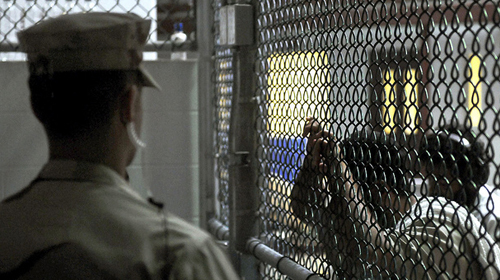Efforts to Close Guantánamo Must Be Accompanied By an End to Force-Feeding


In nominating Clifford Sloan earlier this week to head the Office of Guantánamo Closure, President Obama took a welcome step toward closing the prison at Guantánamo Bay. However, as the hunger strike at the prison continues, more can and must be done now to ameliorate the egregious human rights violations taking place there.
Over 60 percent of the 166 detainees have joined a hunger strike that began in February, prompted in part by the prisoners’ despair over their indefinite detention, even though many have long been cleared for release. Forty-four detainees are now being force-fed. As the ACLU has explained, force-feeding is an excruciating process that violates fundamental human rights including freedom from cruel, inhuman, or degrading treatment. The practice has been decried by the American Medical Association, World Medical Association, International Committee of the Red Cross, numerous United Nations human rights experts, and more. Just two days ago, 150 doctors and medical professionals published an open letter asking President Obama to allow them to treat hunger-striking prisoners. The plea follows a letter last month from 13 detainees asking for civilian doctors, as a result of their mistrust of military doctors who have been force feeding them.
After visiting the detention center in early June, Senator Dianne Feinstein, chairwoman of the Senate Select Committee on Intelligence, wrote an open letter to Defense Secretary Chuck Hagel, expressing her concerns over the procedure, which she said is “inconsistent with international norms.” Senator Feinstein urged the government to “reevaluate the force-feeding policies at Guantanamo Bay and to put in place the most humane policies possible.” We welcome this intervention. Just last month, the ACLU and a coalition of other human rights groups wrote to Secretary Hagel, urging the government to stop force-feeding and calling the process “inherently cruel, inhuman, and degrading.”
Indeed, the policy is grossly inhumane. An article published yesterday in the Daily Beast provides an interactive guide to force-feeding, and describes the process in excruciating detail. Abalmalik Wahab, a Yemeni national who has been imprisoned at Guantánamo since 2002 and has yet to have his day in court, said of procedure: “I was so afraid…They kept asking me to swallow the tube…but it was my first time. It was so difficult.” When the feeding tube was removed, Wahab said it felt like they were sucking his stomach out. Wahab entered the prison weighing 195 pounds and is reportedly down to 129. “I’m a skeleton,” he says. “You can count all of my ribs from 1 meter away.” He is being force-fed twice a day. He can barely sleep: “Sleeping is hard… because I’m sleeping on my bones.”
Renewed efforts to close the prison are commendable, but the administration must also address the immediate rights violations caused by the force-feeding program – and put an end to it.
Learn more about Guantánamo Bay and other civil liberty issues: Sign up for breaking news alerts, follow us on Twitter, and like us on Facebook.

